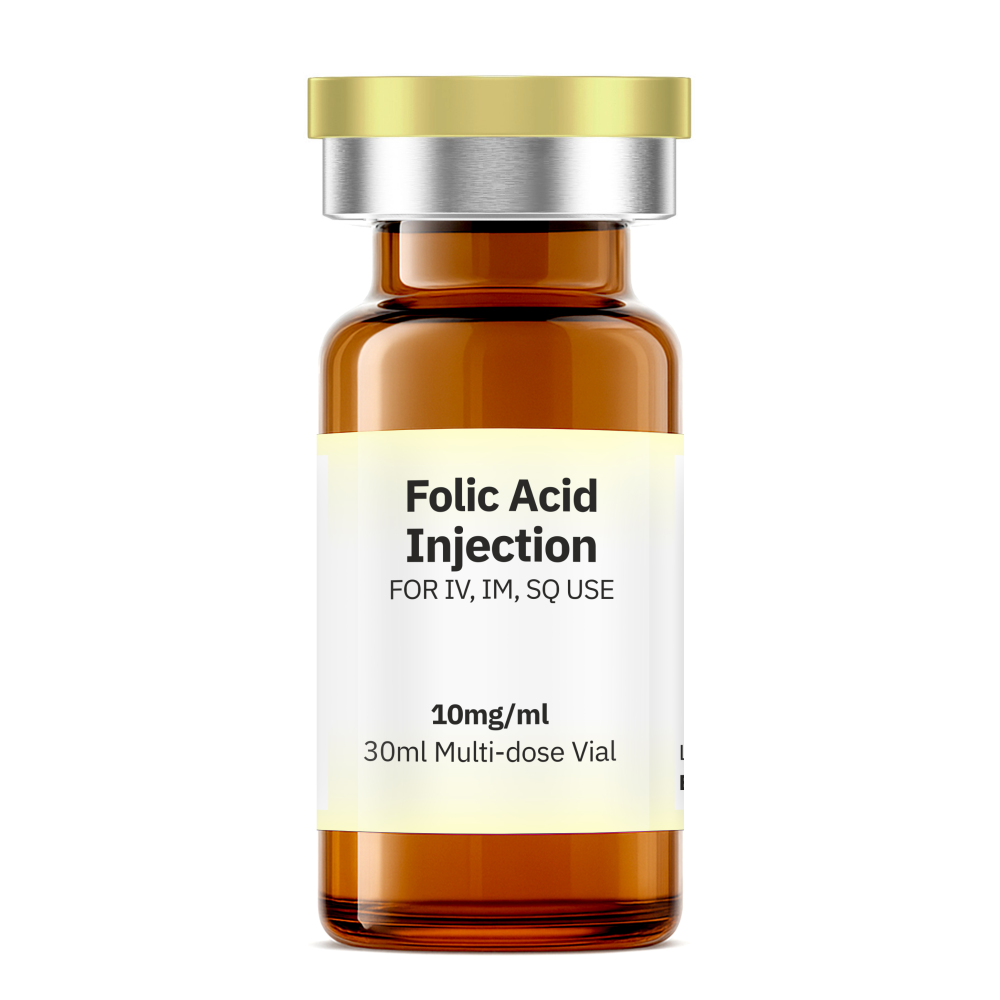
Folic Acid 10mg/mL
Folic acid injections are used to treat or prevent certain types of anemia caused by poor diet, pregnancy, alcoholism, liver disease, and other conditions12. Folic acid, a B-complex vitamin, is essential for forming healthy cells, especially red blood cells [1].
These injections are typically administered into a muscle, vein, or under the skin as directed by a healthcare provider [1]. They are generally well-tolerated, but some people might experience mild side effects like rash or dizziness [1][2].
Available to ship to your site 6-8 weeks after ordered
-
30mL
-
10mg/ml
Folic acid injections can be administered in several ways, depending on the specific needs and condition of the patient. Here are the common methods of administration:
Intramuscular (IM): Injected directly into a muscle.
Intravenous (IV): Administered into a vein.
Subcutaneous (SC): Injected under the skin [3].
-
Folic acid, also known as vitamin B9, plays a crucial role in the body by aiding in the formation of coenzymes necessary for various metabolic processes DNA and RNA Synthesis: Folic acid is essential for the synthesis of purines and pyrimidines, which are the building blocks of DNA and RNA. This is particularly important during periods of rapid cell division and growth, such as during pregnancy and infancy [1][2].
Red Blood Cell Formation: It is vital for the production and maintenance of new cells, especially red blood cells. It is also responsible as an enzyme cofactor and helpful in methanol detoxification.
-
1. Allergy: If you have a known allergy to folic acid or any component of the injection [1][2].
2. Pernicious Anemia: Not indicated for pernicious anemia or other megaloblastic anemias caused by vitamin B12 deficiency [3][4].
3. Undiagnosed Anemia: Should not be used in cases of undiagnosed anemia, as it may mask symptoms of vitamin B12 deficiency [3][4].
Kidney Disease: Use with caution in patients with kidney disease, as the injection may contain aluminum, which can accumulate and cause toxicity [1][2].
Pregnancy and Breastfeeding: Discuss with your doctor if you are pregnant, planning to become pregnant, or breastfeeding [1].
Alcohol Consumption: Alcohol can interfere with the absorption and effectiveness of folic acid [1].
Drug Interactions: Inform your doctor about all medications you are taking, as folic acid can interact with drugs like phenytoin, methotrexate, and barbiturates [3]. -
Possible interactions include:
Anticonvulsants: Taking folic acid with fosphenytoin (Cerebyx), phenytoin (Dilantin, Phenytek) or primidone (Mysoline) might decrease the drug's concentration in your blood [6].
Barbiturates: Taking folic acid with a drug that acts as a central nervous system depressant (barbiturate) might decrease the drug's effectiveness.
Methotrexate (Trexall): Taking folic acid with this medication used to treat cancer could interfere with its effectiveness [6].
Pyrimethamine (Daraprim): Taking folic acid with this antimalarial drug might reduce the effectiveness of the drug [6]. -
Breathing problems: Shortness of breath, wheezing, tightness in the chest [3].
Neurological issues: Pain, tingling, or numbness in the hands or feet [2].
Gastrointestinal issues: Mild upset, abdominal distension, flatulence [3].
Mental changes: Irritability, excitement, mental depression, confusion [3].
If you experience any severe or unusual symptoms, it’s important to seek medical attention immediately. Always consult with your healthcare provider for personalized advice and to ensure the information applies to your specific situation. -
Prevention of birth defects: Folic acid helps prevent neural tube defects in the developing fetus.
Folic acid is a natural part of breast milk. It promotes growth and supports the newborns development.
-
Temperature: Store at room temperature, specifically between 20° to 25°C (68° to 77°F)[3]
Light Protection: Keep the vial in its original carton to protect it from light [3]
Location: Avoid storing in the bathroom or any place with high moisture
Safety: Keep all medications out of reach of children and pets -
1. webmd.com 2. msn.com 3. drugs.com 4. nhs.uk 5. my.clevelandclinic.org 6. mayoclinic.org


